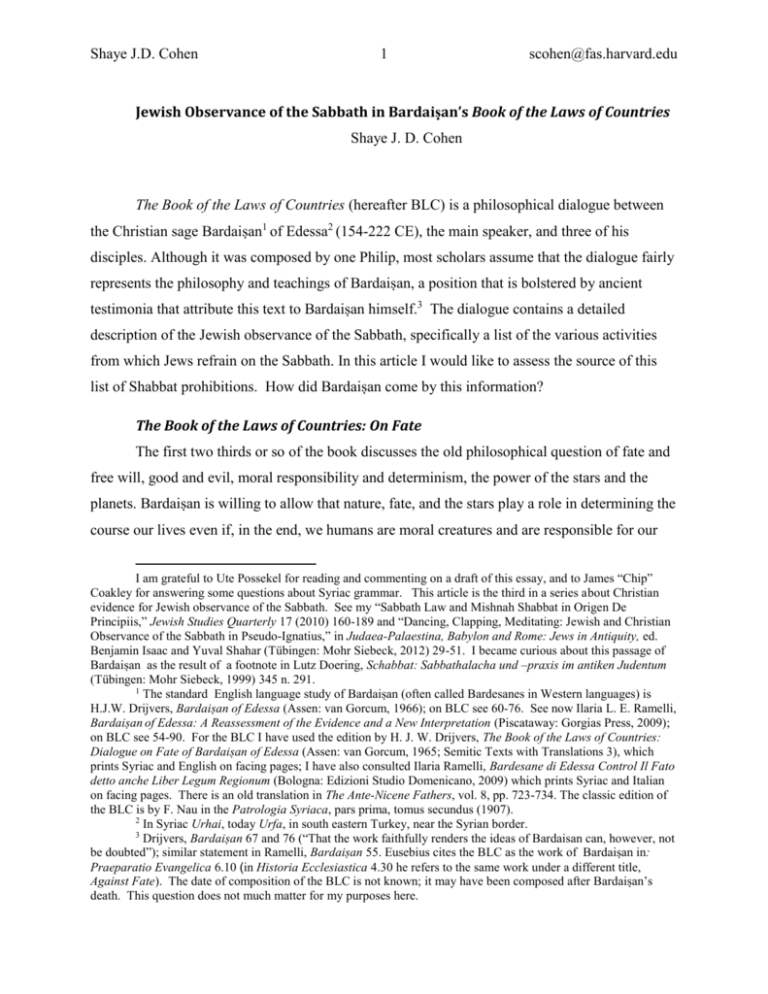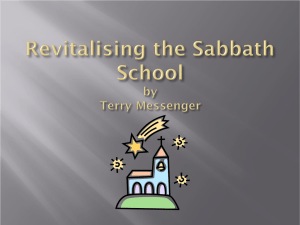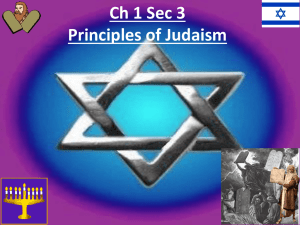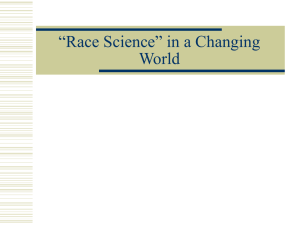Cohen_JewishObservance
advertisement

Shaye J.D. Cohen 1 scohen@fas.harvard.edu Jewish Observance of the Sabbath in Bardaiṣan’s Book of the Laws of Countries Shaye J. D. Cohen The Book of the Laws of Countries (hereafter BLC) is a philosophical dialogue between the Christian sage Bardaiṣan1 of Edessa2 (154-222 CE), the main speaker, and three of his disciples. Although it was composed by one Philip, most scholars assume that the dialogue fairly represents the philosophy and teachings of Bardaiṣan, a position that is bolstered by ancient testimonia that attribute this text to Bardaiṣan himself.3 The dialogue contains a detailed description of the Jewish observance of the Sabbath, specifically a list of the various activities from which Jews refrain on the Sabbath. In this article I would like to assess the source of this list of Shabbat prohibitions. How did Bardaiṣan come by this information? The Book of the Laws of Countries: On Fate The first two thirds or so of the book discusses the old philosophical question of fate and free will, good and evil, moral responsibility and determinism, the power of the stars and the planets. Bardaiṣan is willing to allow that nature, fate, and the stars play a role in determining the course our lives even if, in the end, we humans are moral creatures and are responsible for our I am grateful to Ute Possekel for reading and commenting on a draft of this essay, and to James “Chip” Coakley for answering some questions about Syriac grammar. This article is the third in a series about Christian evidence for Jewish observance of the Sabbath. See my “Sabbath Law and Mishnah Shabbat in Origen De Principiis,” Jewish Studies Quarterly 17 (2010) 160-189 and “Dancing, Clapping, Meditating: Jewish and Christian Observance of the Sabbath in Pseudo-Ignatius,” in Judaea-Palaestina, Babylon and Rome: Jews in Antiquity, ed. Benjamin Isaac and Yuval Shahar (Tübingen: Mohr Siebeck, 2012) 29-51. I became curious about this passage of Bardaiṣan as the result of a footnote in Lutz Doering, Schabbat: Sabbathalacha und –praxis im antiken Judentum (Tübingen: Mohr Siebeck, 1999) 345 n. 291. 1 The standard English language study of Bardaiṣan (often called Bardesanes in Western languages) is H.J.W. Drijvers, Bardaiṣan of Edessa (Assen: van Gorcum, 1966); on BLC see 60-76. See now Ilaria L. E. Ramelli, Bardaiṣan of Edessa: A Reassessment of the Evidence and a New Interpretation (Piscataway: Gorgias Press, 2009); on BLC see 54-90. For the BLC I have used the edition by H. J. W. Drijvers, The Book of the Laws of Countries: Dialogue on Fate of Bardaiṣan of Edessa (Assen: van Gorcum, 1965; Semitic Texts with Translations 3), which prints Syriac and English on facing pages; I have also consulted Ilaria Ramelli, Bardesane di Edessa Control Il Fato detto anche Liber Legum Regionum (Bologna: Edizioni Studio Domenicano, 2009) which prints Syriac and Italian on facing pages. There is an old translation in The Ante-Nicene Fathers, vol. 8, pp. 723-734. The classic edition of the BLC is by F. Nau in the Patrologia Syriaca, pars prima, tomus secundus (1907). 2 In Syriac Urhai, today Urfa, in south eastern Turkey, near the Syrian border. 3 Drijvers, Bardaiṣan 67 and 76 (“That the work faithfully renders the ideas of Bardaisan can, however, not be doubted”); similar statement in Ramelli, Bardaiṣan 55. Eusebius cites the BLC as the work of Bardaiṣan in: Praeparatio Evangelica 6.10 )in Historia Ecclesiastica 4.30 he refers to the same work under a different title, Against Fate). The date of composition of the BLC is not known; it may have been composed after Bardaiṣan’s death. This question does not much matter for my purposes here. Shaye J.D. Cohen 2 scohen@fas.harvard.edu own actions.4 Hence the name of the book in its Greek version, On Fate. The Syriac version– the book is extant complete only in Syriac –is called כתבא דנמוסא דאתרותאThe Book of the Laws of Countries5 which is an accurate description of the last third or so of the book. The argument here is that astrological signs do not have any power over us, as is evident from that fact the individual members of various countries follow their national customs, no matter what astrological sign or star was ascendant when they were born. Hence, concludes Bardaiṣan, the customs of nations are stronger than the astrological powers. To make this point Bardaiṣan briefly surveys some of the salient practices of over a dozen nations, most of them from the region of Edessa or further east (including the “silk-men” of the east and the Brahmans of India), but a few are in the west (Germany, Britain), and at least one nation (the Amazons) is not real at all but fictional. This anti-astrological argument, which scholars call the argument from nomima barbarika, has a long history in Greek philosophy; it begins with Carneades in the middle of the second century BCE and is repeated in the writings of many of his successors, including Philo (see below).6 No doubt Bardaiṣan was familiar with this scholarly tradition and derived this catalogue of nations and customs from his philosophical education.7 But then something new happens, a novel development in the history of the argument from nomima barbarika. Bardaiṣan’s interlocutor suggests that the uniformity of observance of national customs might be due to the power of the planetary rulers of the earth’s zones (קלמא, klimata in Greek) that are posited by the Chaldeans (astrologers). Each planet controls a zone or a region and all its inhabitants. Thus the course of one’s life might be determined either by one’s horoscope or by the astrological ruler of the region in which one is located. Perhaps, then, the uniformity of observance of national customs proves the power of these regional rulers, who ensure that the inhabitants of their regions follow the same customs. Ute Possekel, “Bardaiṣan and Origen on Fate and the Power of the Stars,” Journal of Early Christian Studies 20 (2012) 515–541. 5 “Countries” is the standard English translation; “regions” or “districts” might be better. 6 The classic studies of this anti-astrological argument, cited and exploited by all subsequent studies, are: Paul Wendland, Philos Schrift über die Vorsehung (Berlin, 1892) 24-37, and Franz Boll, Studien über Claudius Ptolemäus: ein Beitrag zur Geschichte der griechischen Philosophie und Astrologie (Leipzig: B.G. Teubner, 1894) 181- 188 (section entitled “Die nomima barbarika als Beweis gegen die Astrologie”). See too Henry Chadwick, “Origen, Celsus and the Stoa,” Journal of Theological Studies 48 (1947) 35, which is cited by Chadwick in his note on his translation of Origen, Contra Celsum 5.27 p. 284. 7 In fact, Bardaiṣan remarks “I shall now begin to relate these [national laws] in so far as I remember them” (p. 40-41 lines14- 15, )אשרא למאמר כמא דעהד אנא. He is reciting what he has learned. 4 Shaye J.D. Cohen 3 scohen@fas.harvard.edu This pro-astrology argument, which has been called the argument from astrological geography,8 is rejected out of hand by Bardaiṣan: these regional rulers are fictional, he says, having been invented by the Chaldeans for the sole purpose of rebutting the argument from the nomima barbarika. Bardaiṣan then advances three specific arguments against the idea that astrological rulers of regions are responsible for the observance of the national customs in their regions. First, not all members of a national group necessarily observe the national customs the same way. In his survey of the national customs Bardaiṣan had already observed that some Hindus eat human flesh, while other Hindus are vegetarians.9 How can this be explained if all the inhabitants of India are equally under the control of their regional ruler? Second, human sages and rulers can change the laws of their provinces. Bardaiṣan adduces two specific examples. The Romans, after conquering Arabia, put an end to circumcision that had been practiced there; and King Abgar of Edessa put an end to the self-emasculation that had been practiced by the devotees of Atargatis (the Dea Syria). These facts are hard to understand, says Bardaiṣan, if national customs are under the tutelage of regional astrological rulers.10 Third and last, some nations are scattered throughout the world, but wherever they live they follow the same customs. This argument is developed in two complementary ways: (a) since people living in many different regions observe the same customs, they clearly are not under the influence of regional astrological rulers; (b) since they follow their own customs, no matter where they live, and ignore the customs of the people among whom they live, they clearly are not under the influence of regional astrological rulers. To illustrate these arguments Bardaiṣan adduces Persians and Magians briefly, and Jews and Christians at greater length.11 8 For astrological geography, also called mundane astrology, see Possekel , “Bardaiṣan and Origen,” note 62, who refers to E. Honigmann, Die sieben Klimata (1929) and Tamsyn Barton, Ancient Astrology (London: Routledge, 1994) 179-185. The phrase “astrological geography” goes back to Boll, Studien 185 (who credits Schleiden). 9 Pp. 54-55 lines 20-23. 10 Pp. 56-57 lines 9-19 and pp. 58-59 lines 20-24. On King Abgar and the followers of Atargatis, see H.J.W. Drijvers, Cults and Beliefs at Edessa (Leiden: Brill, 1980) 76-78. 11 Persians and Magians: pp. 54-55 line 23 – 56-57 line 9. Jews: 56-57 line 21- 58-59 line 20. Christians: 58-59 line 24 – 60-61 line 16. On these arguments see Boll, Studien 185: Der erste folgert aus der Gleichheit der Sitten und Gesetze bei den Angehörigen eines und desselben Volkes, dass nicht der Einfluss der Gestirne, sondern die Willkür menschlicher Einrichtungen das Leben des Einzelnen bestimmt. Der zweite dagegen folgert gerade umgekehrt aus der moralischen Eigenart einzelner Bewohner eines Landes, dass die Völkersitten nicht durch die Klimata und also auch nicht durch die Sterne bedingt sind, die über jedes Klima oder jeden Teil der oikoumene nach Ansicht der Astrologen herrschen. Shaye J.D. Cohen 4 scohen@fas.harvard.edu These three arguments seem to be Bardaiṣan’s original contribution to this debate about astrology; they are not attested anywhere before Bardaiṣan, and their later appearances, all in the works of Christian authors, may well derive from Bardaiṣan. Before Bardaiṣan the promoters of the anti-astrological argument from the nomima barbarika had not responded to the counterargument from astrological geography or cited as anti-astrological evidence the trans-regional character of Jews and Christians. Bardaiṣan is advancing an original set of arguments.12 Bardaiṣan on the Jews Here is Bardaiṣan on the Jews:13 .ודיתיר מן כל מדם דין משכחא למפסו לסכלא ולחסירי הימנותא אמר לכון ולא מקוין.יהודיא כלהון דקבלו נמוסא ביד מושא לבניהון דכרא ביומא דתמניא גזרין להון אלא.למאתיתא דכוכבא ולא מתכחדין מן נמוסא דאתרא ולא דבר להון בקטירא כוכבא דמשלט בקלמא אן באדום אנון או בערב או ביון או בפרס ואן בגרביא ואן בתימנא הנא נמוסא דסים להון מן אבהיהון וידיע דהנא מדם דעבדין לא הוא מן בית ילדא לא גיר משכחא דכלהון יהודיא ביומא תמיניא.עבדין וכלהון אתר דאיתיהון לפתכרא לא.דמתגזרין נקום להון ארס איכנא דנגדא עליהון פרזלא ונשתפע דמהון וחדא לשבעא יומין הנון ובניהון בטלין מן כל עבד ומן כל בנין ומן כל מרדי ומן דלמזבן ולמזבנו ולא.דחלין חיותא קטלין ביומא דשבתא ולא נורא סימין ולא דינא דינין ולא משתכח בהון אנש דפקד לה חלקא דביומא דשבתא או נדון ונזכא או נדון ונחוב או נסתור או נבנא או נעבד חדא מן צבותא דכלהון בני אנשא אילין דנמוסא הנא לא קבלו עבדין אפ אחרניתא צבותא אית להון דלא הוא איך שרכא דבני אנשא הלין גיר לא הוי דשולטנה.מתדברין בהין כד בה ביומא הנא אפ ילדין אפ מתילדין ומתכרהין ומיתין .דברנשא But I shall tell you another thing too, more convincing than all the rest to fools and unbelievers. All the Jews that have received the law of Moses circumcise their male children on the eighth day, without waiting for the coming of stars and without revering the law of 12 That the argument for and against astrological geography is extant exclusively in Christian authors of whom Bardaiṣan is the first, was observed by Boll, Studien 185-186. Bardaiṣan’s originality was argued in 1910 by F. Haase (see Drijvers, Bardaiṣan of Edessa 34) and repeated by Ramelli, Bardaiṣan 24. 13 BLC 56-57 line 21- 58-59 line 20. I have transcribed the Syriac into Hebrew letters. The translation is that of Drijvers with some slight modifications. This passage is also extant in Greek in Eusebius, Praeparatio Evangelica 6.10.42-43 p. 342 ed. Mras, and in Latin (translated from a lost Greek version) in Recognitiones Clementinae 9:28 pp. 308-311 ed. Rehm-Strecker. These translations are shortened and edited versions of the Syriac. See note 22 below. Shaye J.D. Cohen 5 scohen@fas.harvard.edu the place.14 And the star that rules their zone15 does not have the power to rule them. But whether they are in Edom or in Arabia, in Greece or in Persia, in the North or in the South, they observe the law laid upon them by their fathers. And clearly they do not do this because of their nativity, for it is impossible that on the eighth day, when they are circumcised, Mars should be in such a position with regard to all Jews, that iron comes over them and their blood is spilt.16 Everywhere they are they do not worship idols, and on one day in the week they and their children desist from all work, from all building, and from all travel, and from buying and selling. Neither do they kill an animal on the Sabbath, kindle a fire, or render judgment. And among them there is found no one who is charged by fate on the Sabbath to be judged and found innocent or to be judged and found guilty,17 or to tear down18 or to build, or to do a single one of those things which all people do who have not received this law. They have other precepts also, through which they lead a life different from that of other people, although on this day too they beget and are begotten, fall ill and die, for over these things humans have no power. This passage is remarkable for its tone and its content. Although written by a Christian author, it is completely devoid of anti-Jewish animus. For Bardaiṣan the Jews are simply one people of many, and their customs are simply just another set of national customs. What makes the Jews useful for Bardaiṣan is the same thing that makes Christians useful: they live in many areas, they maintain their customs no matter where they live, their customs make them different from their neighbors. Thus Jews, like Christians, provide useful evidence against astrological geography. No hint that the Christians are the true people of God, and that the Jews are not; no hint that the Jews miscomprehend the Torah and that they observe their laws in vain; no hint that the Jews have rejected God, and that God has rejected them. Bardaiṣan identifies himself as a 14 That is, the law set up by the astrological ruler of the region (cf. p. 54-55 line 10 and p. 60-61 line 14). It is possible that Bardaiṣan means the law established by the human rulers of the place (cf. p. 40-41 line 11) but this seems to be a less natural reading. 15 קלמא, klima. 16 Cf. the amazing story in Y. Avodah Zarah 2:2 (end) 41a col. 1386 ed. Zussman. This story requires study. 17 Or “to be judged and be victorious, or to be judged and be condemned.” 18 The Greek version adds “a house” which Drijvers follows. Shaye J.D. Cohen 6 scohen@fas.harvard.edu Christian (“us Christians”) but is free of the anti-Jewish animus that will characterize so many of his Christian contemporaries and successors (like Aphrahat and Ephrem). The passage’s content is no less remarkable than its tone. What does Bardaiṣan know about the Jews? He knows that they circumcise their sons on the eighth day, that they do not worship idols, and that they do not do any manner of work on the Sabbath. Bardaiṣan knows that the Jews have many other precepts too by which they are distinguished from other people, but he mentions only these three. He provides no details about circumcision and the avoidance of idols, but he does provide details about the avoidance of labor on Shabbat. Here in list form is his description of the Jewish Sabbath prohibitions; the Jews desist from all labor, specifically: 1. They do not build 2. They do not travel 3. They do not buy 4. They do not sell 5. They do not kill an animal 6. They do not kindle a fire 7. They do not render judgment 8. They do not go to court to be judged 9. They do not tear down 10. They do not build If we acknowledge the repetition of building (nos. 1 and 10), a repetition for which I have no explanation19, we are left with nine Sabbath prohibitions. This is an extraordinarily detailed list, perhaps the most detailed list of Sabbath prohibitions from any ancient non-Jewish author.20 One Greek writer of the mid second century Ute Possekel reminds me that in Syriac the root בנא, “build,” can mean “to build up, edify, compose”, and the root סתר, “destroy, tear down,” can mean “to refute an argument” (see the standard lexica), thus raising the possibility that the first reference to “building” is a prohibition of construction, while the latter (together with its antonym) is a prohibition of eristic debate. This prohibition of arguing pro and con is thus related to the adjacent prohibition of going to court. The prohibition of inappropriate speech on the Sabbath is certainly attested -- see the discussion in Yitzhak Gilat, Studies in the Development of the Halakha (Bar Ilan University Press, 1992) 255-258 – but I do not see how Bardaiṣan could have meant the verbs “build/tear down” to be understood in a metaphorical sense without alerting the reader. Surely the more natural reading is to understand the prohibition of building/destroying as prohibitions of construction and destruction. As for the repetition of the prohibition of building , this can be explained in various ways – or simply left alone as a lapsus calami. (If we insist on an explanation with the dignity of a Latin rhetorical term, we may call this repetition an inclusio.) 19 Shaye J.D. Cohen 7 scohen@fas.harvard.edu BCE reports that the Jews neither bear arms nor farm on the Sabbath. A slightly younger contemporary, a poet, seems to allude to the Jewish abstention from using fire on the Sabbath. One Roman poet of the Augustan age seems to know that Jews would not travel on the Sabbath; another seems to know that Jews would not conduct business on the Sabbath.21 Ancient Christian authors do not know much more.22 So we cannot appeal to a literary tradition of non-Jews detailing the Sabbath prohibitions of Jews. Everyone in antiquity who knew anything about the Jews knew that they refrain from work on the Sabbath; but Bardaiṣan knows more details than anyone else and knows details unknown to anyone else. Whence comes this knowledge? Perhaps he knew some of these prohibitions from Scripture. The prohibition of kindling a fire is stated explicitly in Exodus 35:3.23 The prohibition of travel was deduced, by some Jews at least, from Exodus 16:29.24 The prohibition of buying and selling might easily be deduced from Jeremiah 17:19-27 and Nehemiah 13:15-22.25 The other prohibitions, however – killing an 20 For a survey of the comments of Greek and Latin authors on the Sabbath, see Peter Schäfer, Judaeophobia: Attitudes towards the Jews in the Ancient World (Cambridge: Harvard University Press, 1997) 8292, and Doering, Schabbat 285-289. 21 References and discussion in Shaye J.D. Cohen, “’Common Judaism’ in Greek and Latin Authors,” in Redefining First-Century Jewish and Christian Identities: Essays in Honor of E.P. Sanders, ed. Fabian Udoh et al. (University of Notre Dame 2008) 69-87, at 73-74 (referring to Agatharchides, Meleager, Tibullus, Horace). The exact reference of some of these passages is elusive. 22 Aphrahat, for example, provides no details about the Jewish observance of the Sabbath; see Jacob Neusner, Aphrahat and Judaism (Leiden: Brill, 1971) 41-50 (a translation of Demonstratio 13). For a survey see Heinz Schreckenberg, Die christlichen Adversus-Judaeos-Texte und ihr literarisches und historisches Umfeld (1.11. Jh.) (Frankfurt a.M.: Peter Lang, 1982) index s.v. Sabbatruhe. 23 Bardaiṣan writes ולא נורא סימין, “they do not kindle (lit. lay down ) a fire.” Cf. 1 Kings 18:23 ואש לא אשים... ואש לא ישימוwhich is rendered in the Peshitta as ונורא לא אסים...ונורא לא נסימון. See too John 18:18 סימין הוו נורא, “they were kindling a fire.” Eusebius’ Greek version reads oute puri khrôntai and the Latin version of the Clementine Recognitions reads nec igni utuntur, “they do not use a fire.” Perhaps we may see here a reflection of an inner-Jewish debate about the interpretation of Exodus 35:3, with one side (the rabbinic Sages) arguing that kindling a fire is prohibited on the Sabbath, but using (for light, for warmth, etc.) a fire which had been kindled before the Sabbath is permitted, and the other side (Samaritans, medieval Karaites, perhaps ancient Sadducees and the book of Jubilees) arguing that no fire may remain lit on the Sabbath, no matter when it was kindled. On this debate see Doering, Schabbat 96-97, 328-331 and 492-493. The Syriac Bardaiṣan attributes to the Jews a practice consonant with that of the rabbinic sages, while the Greek Bardaiṣan attributes to them a practice consonant with that of the Karaites. It is equally possible, and I think more likely, that the Greek and Latin translators have correctly interpreted Bardaiṣan’s statement. Bardaiṣan said “kindle” but meant “allow to remain burning.” Compare Didascalia Apostolorum 21 p. 216 line 12 ed. Vööbus, ) דמתאבל לא מנהר נוהרא (נורא, which is translated by Vööbus “he who mourns kindles no light” but which clearly means “he who mourns uses no light” – he sits in the dark. 24 Cohen, “Origen” 165-175. 25 And perhaps Amos 8:5 and Isaiah 58:13. Shaye J.D. Cohen 8 scohen@fas.harvard.edu animal,26 sitting as judge, participating in a judicial proceeding, tearing down, and building – have no basis in Scripture and must have reached Bardaiṣan from somewhere else. Whence? Bardaiṣan and the Jews of Edessa Is it possible that Bardaiṣan learned this list of Sabbath prohibitions by observing the behavior of the Jews of Edessa or by chatting with them? Certainly some of the nine prohibitions detailed by Bardaiṣan have a public dimension that might have been noticed by non-Jews. (John Chrysostom has a wonderful description of Jewish merchants who, at the approach of the Sabbath on late Friday afternoon, close up shop and refuse all offers for their merchandise.27 Did Bardaiṣan observe the same behavior in Edessa?) And certainly this section of the BLC, the response to the argument from astrological geography, gives the impression that Bardaiṣan is recounting things that he knows from personal experience or from living contemporaries: he speaks about current events (the Roman takeover of Arabia), about local history (King Abgar of Edessa), about the neighbors across the border (Persians), and about “us Christians.” Perhaps, then, when he is speaking about Jews, although he refers to the fact of their dispersion throughout the world, he has in mind the Jews of Edessa. If this is correct, we have recovered an important witness to the religious life of the Jews of Edessa, a subject about which we otherwise have no information. Various Christian texts imply that there was a Jewish community in the city, including a synagogue; various texts imply a close connection between the Jews of Edessa and the Jews of Adiabene, but no evidence has yet surfaced that reveals the inner life of the community.28 Hence the potential value of this list of Bardaiṣan. Here at last is a window into an important aspect of the religious life of the Jews of Edessa. We get a sense how they observed the Sabbath. Particularly interesting are the implications of number seven (and perhaps eight) on I am not sure whether Bardaiṣan means “slaughtering” or “hunting.” Robert Wilken, John Chrysostom and the Jews (Berkeley: University of California, 1983) 66: 28 On Jews and Judaism in Edessa, see J. B. Segal, “The Jews of North Mesopotamia,” in Yehoshua M. Grintz and Yaaqov Liver edd., Sepher Segal: Studies in honor of Moshe Tsevi (Moses Hirsch) Segal (Jerusalem: ha Hevrah le heqer ha miqra be yisrael, 1964) 32*-63*, summarized in his Edessa the Blessed City (Oxford: Clarendon Press, 1970) 41-43, 67-69, 100-104. See too H.J. W. Drijvers, “Edessa und das judische Christentum,” Vigiliae Christianae 24 (1970) 4-33, at 10-12 (reprinted in his East of Antioch: Studies in Early Christianity [London: Variorum Reprints, 1984]) and Isaiah Gafni et al., "Edessa,"Encyclopaedia Judaica, ed. Michael Berenbaum and Fred Skolnik (Detroit: Macmillan Reference USA, 2007; second ed.; Gale Virtual Reference Library, accessed 10 Feb. 2013) 6.146-147. Three Jewish inscriptions from Edessa do not reveal much: Inscriptiones Judaicae Orientis III Syria and Cyprus, ed. David Noy and Hanswulf Bloedhorn (Tübingen: Mohr Siebeck, 2004) pp. 128-132. 26 27 Shaye J.D. Cohen 9 scohen@fas.harvard.edu the list: the Jewish community of Edessa enjoyed judicial autonomy, with its own court and its own judges. The court was closed on the Sabbath.29 This interpretation is possible, to be sure, but I do not see any way either to prove it or to disprove it. While it is possible that Bardaiṣan has given us a rare and valuable glimpse of the religious life of the Jews of Edessa, there are at least two other possibilities that we must consider. Bardaiṣan and Philo The De Providentia of Philo is extant only in Armenian, but its authenticity as a genuine work of Philo is generally acknowledged by modern scholars.30 In this essay Philo, as Bardaiṣan would do a century and a half later, argues that we humans are moral creatures, responsible for our own actions. Part of Philo’s argument is drawn from the nomima barbarika, and, since this is Philo, the Jews head the list of nations whose customs are surveyed. Philo writes as follows:31 Have not the Jews freely chosen the law of circumcision, a law which they have never neglected but which they have transmitted instead to their descendants with such fidelity that no nativity and no constellation has been able to remove it? It is the law of the spirit which rules over them, not a horoscope. Likewise they cease from work on the seventh day, which they call the Sabbath. Furthermore, they abstain from those meats which the law does not permit. Now it cannot be said that one and the same nativity has befallen all of them, by which they are forcibly constrained to observe what God mandated to Moses. If therefore Jews display from the womb a nativity that differs in 29 On the judicial and political autonomy of Jewish diaspora communities see the introduction to James M.S. Cowey and Klaus Maresch, Urkunden des Politeuma der Juden von Herakleopolis (144/3-133/2 v. Chr.) (P. Polit. Iud.) (Wiesbaden: Westdeutscher Verlag, 2001). 30 The authenticity of the De Providentia was first established by Wendland, Philos Schrift über die Vorsehung. On the Armenian version of the De Providentia, see Maurizio Olivieri, “Philo’s De Providentia: a Work between Two Traditions,” in Studies on the Ancient Armenian Version of Philo’s Works, ed. Sara M. Lombardi and P. Pontani (Leiden/Boston: Brill, 2011) 87-124. 31 Philo, De Providentia 1.84; my translation/paraphrase is based on the Latin of J. B. Aucher, which in turn is the basis for the French of Mireille Hadas-Lebel, and the German of Ludwig Früchtel . See Hadas-Lebel, Les oeuvres de Philon d’Alexandrie tome 35: De Providentia (Paris: editions du Cerf, 1973) 194-197 (who also prints Aucher’s Latin) and Früchtel, Philo von Alexandria Die Werke in deutscher Übersetzung, ed. Leopold Cohn et al. vol. 7 (Berlin: de Gruyter, 1964) 317. Shaye J.D. Cohen 10 scohen@fas.harvard.edu season, hour, and day, and nonetheless have a single manner and order of life and discipline of law, how can we say that all men are subject to horoscopes?32 Philo provides no details. His brief survey of Jewish circumcision, abstention from labor on the Sabbath, and avoidance of forbidden meat, closely resembles Bardaiṣan’s survey of Jewish circumcision, the avoidance of images, and the abstention from labor on the Sabbath. The argument is the same: do not all Jews, no matter their nativity and no matter their horoscope, observe these laws? Philo, however, does not yet know the counter-argument from regional rulers and astrological geography, and the response to it. That is Bardaiṣan’s innovation, but otherwise this passage of Philo bears a striking resemblance to our passage of Bardaiṣan.33 In another passage Philo provides a catalogue of Sabbath prohibitions that resembles Bardaiṣan’s. Philo argues that a true sage ought to be righteous as well as to be seen as righteous. Consequently, even those philosophically minded Jews who recognize the primacy of the inner (or allegorical or metaphorical) meaning of the commandments ought not to slight their literal observance, because a sage should behave in a way that will not upset his brethren.34 Philo illustrates this argument by citing a few commandments that a sage must not slight. His first example is the Sabbath; he writes as follows:35 It is quite true that the Seventh Day is meant to teach the power of the Unoriginate and the non-action of created beings. But let us not for this reason abrogate the laws laid down for its observance and light fires or till the ground or carry loads or institute proceedings in court or judge36 or demand the restoration of deposits or recover loans or do all else that we are permitted to do as well on days that are not festival seasons. Philo’s list of Sabbath prohibitions is: 32 Nonne et Judaei legem circumcisionis libero arbitrio elegerunt, quam nusquam dimisere, sed potius per successionem posteris suis praebuere: ita ut nec natalitia, neque constellationes potuerint eam tollere? Lex enim mentis imperat eis, non genethlialogia. Eodem modo cessant ab operibus die septima, quam Sabbatum ipsi appellant. Necnon ab illis carnibus, quas lex non permisit, abstinent. Nequit autem dici, quod unum ac idem omnibus contigerit natalitium quo adigantur per vim id servare quod Moysi Deus in mandatis dedit. Si ergo diversis temporibus horis ac diebus Judaei praeseferunt ex utero natalitium, et nihilominus una est illis ratio vitae ac ordo legisque disciplina, quomodo universos homines dicamus genethlialogiae esse subjectos. 33 Wendland noticed the striking parallel between Philo and Bardaiṣan, and, as a good German scholar of the nineteenth century, suggested a common source. A simpler suggestion is that Philo introduced the Jews into the nomima barbarika argument, and Bardaiṣan was inspired by Philo. But did Bardaiṣan know Philo? See below. 34 Cf. Paul, 1 Corinthians 8. 35 Philo, De Migratione Abrahami 91, trans. F. H. Colson in the Loeb Classical Library, vol. 4, pp. 182185. 36 Colson translates “act as jurors.” Shaye J.D. Cohen 11 scohen@fas.harvard.edu 1. Not to light fires 2. Not to till the ground 3. Not to carry loads 4. Not to institute proceedings in court 5. Not to judge 6. Not to demand restoration of deposits 7. Not to recover loans Philo and Bardaiṣan have three prohibitions in common: not to light a fire, not to render judgment, not to go to court.37 In addition Bardaiṣan’s prohibitions of buying and selling are thematically related to Philo’s prohibitions of demanding restoration of deposits and recovering loans. In spite of these overlaps Philonic Sabbath piety does not precisely line up with Bardaiṣan’s; nowhere does Philo explicitly prohibit traveling, killing an animal, tearing down, or building on the Sabbath. However, Bardaiṣan’s list is similar to Philo’s in length and content, and the overlap between them, as well as the parallel between the BLC and Philo’s De Providentia, suggest that Bardaiṣan may well have derived at least some of his information about the Sabbath from Philo.38 If this is correct, Bardaiṣan’s list of Sabbath prohibitions tells us little about the Jews of Edessa in the third century but may tell us something about Hellenistic Jewry at an earlier time (first century CE?). The major objection here is that there is little evidence to support, and much reason to doubt, the suggestion that Bardaiṣan knew the works of Philo.39 Bardaiṣan and the Mishnah There is one more possibility to explore. Edessa is about 400 miles (600 km) by air to the Galilee, where the sages were creating the Mishnah at precisely the same time that Bardaiṣan was discussing fate and astral determinism with his students, and a little more than 400 miles (600 km) by air to Mahoza, the heartland of what would soon become rabbinic Babylonia. Edessenes spoke Aramaic, as did the rabbinic sages. Did the Jews of Edessa have contacts with Bardaiṣan’s prohibition of going to court for trial is not exactly the same as Philo’s prohibition of instituting legal proceedings, but they are close. 38 For the Sabbath prohibitions according to Philo, see Doering, Schabbat 315-366. Other lists of Sabbath prohibitions appear in Jubilees 2:29-30 and 50:6-13 and Damascus Covenant 10:14-11:18, but I don’t believe that they have any connection with Bardaiṣan. 39 Drijvers, “Edessa und das judische Christentum” 25, flirts with the idea that Bardaiṣan knew Philo (see too Ramelli, Bardaiṣan of Edessa 23). David T. Runia, Philo in early Christian Literature (Assen: van Gorcum, 1993) 22 n. 90 reports that Drijvers later abandoned this suggestion. Ute Possekel observes that the works of Philo were never translated into Syriac. 37 Shaye J.D. Cohen 12 scohen@fas.harvard.edu the rabbinic sages of either Roman Palaestina or Parthian/Sassanian Babylonia? Did they know the Mishnah? Or perhaps may we imagine that Bardaiṣan had a conversation with a rabbinic Jew and thus learned about Jewish Sabbath prohibitions? The Mishnah lists thirty nine labors prohibited on the Sabbath. Four of Bardaiṣan’s nine prohibited labors appear on the Mishnah’s list: not to light a fire, not to kill an animal, not to tear down, not to build.40 The recurrence of the oppositional pair of tearing down/building is noteworthy, since this pair of prohibitions is first attested in ancient Judaism in this Mishnah. Also noteworthy is the fact that all the remaining prohibitions on Bardaiṣan’s list are also prohibited by rabbinic tradition, if not on the Mishnah’s canonical list of prohibited Sabbath labors then elsewhere, if not exactly as formulated by Bardaiṣan then close to it: not to travel,41 not to judge (and by extension not to go to court),42 not to buy and sell.43 Bardaiṣan’s list is entirely consistent with rabbinic Sabbath piety. May we conclude that Bardaiṣan’s list of Sabbath prohibitions is evidence – our first and only piece of ancient evidence – for the extension of rabbinic piety from Roman Palaestina (or perhaps Parthian/Sassanian Babylonia) to Edessa? As before, a definitive response is beyond our grasp, but I believe that the answer is more likely to be a no than a yes. To establish a connection between the two documents or between the two pieties we should like to see some unusual law, some striking expression, some unusual observance in common.44 In our case the strongest evidence for a connection between Bardaiṣan’s list and the Mishnah is that both have the paired prohibitions of tearing down and building. That is all; is that enough? Bardaiṣan does not mention any of the most characteristic rulings and concerns of Mishnah Shabbat, such as the prohibition of transporting an item from one domain to another, the construction of an eruv, the prohibition of moving even within one’s domain an item which has no permitted use on the Sabbath, the distinction between acts that are prohibited but non-culpable and acts that are prohibited and culpable, the importance of preparing food and utensils in advance of the Sabbath, etc. Had 40 41 M. Shabbat 7:2. The Mishnah prohibits both slaughtering and hunting. Not to ride on an animal M. Betsah 5:2; not to travel more than 2000 cubits M. Sotah 5:3. See note 23 above. 42 M. Betsah 5:2 (prohibits judging and other judicial acts); M. Sanhedrin 4:1; cf. Josephus, Jewish Antiquities 16.163. 43 Cf. M. Shabbat 23:1-3; B. Betsah 37a. As noted above the prohibition of buying and selling is biblical: Amos 8:5; Isaiah 58:13; (Jeremiah 17:21-27); Nehemiah 13:15-22. 44 As is the case with Origen, who mentions the prohibition of wearing nailed sandals; see Cohen, “Origen.” Shaye J.D. Cohen 13 scohen@fas.harvard.edu Bardaiṣan mentioned any of these there would be no doubt that he – or his informant or perhaps the Jewish community of Edessa – is familiar with Mishnaic law and rabbinic piety. But he does not mention any of these. I think the burden of proof is upon the one who would argue that rabbinic Jews could be found in Edessa; an ambiguous passage from the BLC of Bardaiṣan is not sufficient. The more natural assumption is that the Jews of Edessa were a Hellenistic Jewish diaspora community; such communities, to be sure, may have had connections with the rabbinic sages of Roman Palaestina, but ultimately had a separate existence.45 The Jews of Edessa did not look to the Talmudic sages for guidance and instruction. Edessa is not mentioned even once in either the Talmud of the land of Israel or the Talmud of Babylonia.46 Conclusion In his BLC Bardaiṣan includes a list of nine (ten) labors that Jews do not perform on the Sabbath. For Bardaiṣan the universality of this Jewish practice is evidence against the belief in astral determinism and astral geography. How did Bardaiṣan learn this list of labors that Jews avoid on the Sabbath? In this essay I have surveyed three answers to this question, each of which is possible, none of which is verifiable. Each of which, if correct, bears with it a substantial scholarly novelty. First, perhaps Bardaiṣan’s source is the Jewish community of Edessa. Bardaiṣan is reporting what he saw, and he saw the behavior of the Jews of Edessa. They observed the Sabbath by (among other things) abstaining from these nine labors. If correct, this explanation is news indeed, for we otherwise have no information about the religious observances of the Jews of Edessa. The strongest argument in its favor is that in this section of the BLC Bardaiṣan seems to be relaying information that he knows first-hand either through personal experience or through speaking with contemporaries, but we have no way of assessing the plausibility or implausibility of this explanation. Second possibility: perhaps Bardaiṣan knew the works of Philo. From Philo he will have learned the utility of citing Jewish observances in an anti-astrological argument, and from Philo 45 Doron Mendels and Arye Edrei, Zweierlei Diaspora: zur Spaltung der antiken jüdischen Welt (Göttingen: Vandenhoeck & Ruprecht, 2010). 46 Edessa is mentioned once in Genesis Rabbah; see Aharon Oppenheimer, Babylonia Judaica in the Talmudic Period (Wiesbaden: Ludwig Reichert, 1983) 133-134 s.v. Hadas. Relying on the work of Jacob Neusner, Drijvers, "Edessa und das jüdische Christentum" 11, writes, “Von einem tannaitischen Judentum in Edessa ist uns nichts bekannt, and keiner von den Tannaim wird mit dieser Stadt in Verbindung gebracht.” Shaye J.D. Cohen 14 scohen@fas.harvard.edu he might have learned at least some of the content of his list of Sabbath prohibitions. The culture of Edessa was heavily Hellenized; even the Syriac speakers knew Greek, Greek literature, and Greek philosophy, so there is nothing implausible about this explanation. But if correct, this explanation is news indeed, because there otherwise is no evidence that Bardaiṣan knew Philo. Third possibility: perhaps there is a connection between Bardaiṣan’s list and the Mishnah, which was being composed at the same time as the BLC. Perhaps a Jew from Palaestina came to Edessa with the Mishnah in his backpack47 and told Bardaiṣan about the Mishnah’s Sabbath prohibitions. Or perhaps we might imagine (returning to the first possibility) that the Jews of Edessa were observing the Sabbath rabbinically and mishnaically. The advantage of this explanation is that it accounts for all the items on Bardaiṣan’s list. If correct, this explanation is news indeed, for we otherwise have no indication of any connection between the Jews of Edessa and the rabbinic sages of Roman Palaestina. Since possibilities two and three each stumble over a serious objection – if we are to believe that Bardaiṣan knew Philo or that the Mishnah reached Edessa, we need more and better evidence than what I have provided here– that leaves the first possibility as the most plausible. Bardaiṣan’s list of Sabbath prohibitions most probably derives from his own eye-witness familiarity with the practices of the Jews of Edessa. They were a Sabbath-observant community; their Sabbath piety was consistent with rabbinic piety, but there is no evidence that they had any knowledge of the rabbinic textual tradition. 47 His metaphorical backpack – the Mishnah was an oral text.









